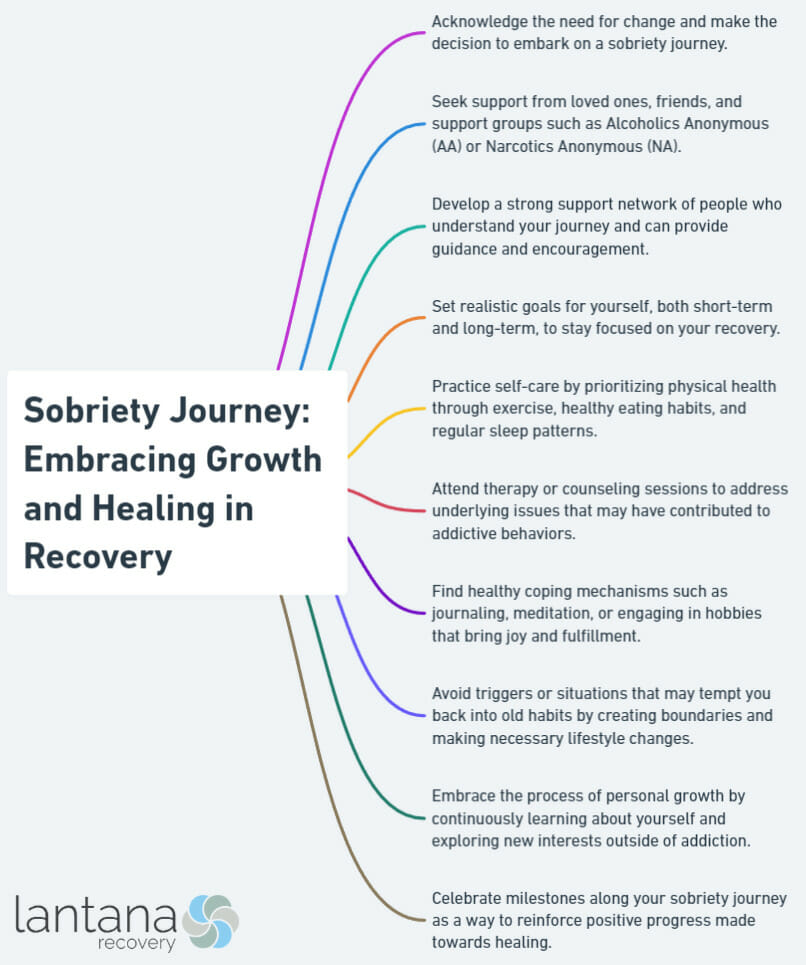Sobriety is a transformative journey that involves embracing growth and healing in recovery. It is a commitment to living a life free from substance abuse and finding inner peace and fulfillment. Understanding what sobriety truly means is the first step towards this profound personal change.
Embracing growth in recovery is crucial for long-term success and well-being. It involves setting realistic goals for personal development, such as improving self-esteem, developing healthy coping mechanisms, and enhancing communication skills. Practicing self-reflection and mindfulness allows individuals to gain insights into their thoughts, emotions, and behaviors, leading to self-awareness and personal growth.
The healing process in sobriety encompasses three crucial aspects: physical, emotional, and social healing. Physically, it involves restoring the body through proper nutrition, exercise, and rest. Emotionally, it involves addressing underlying trauma, managing mental health conditions, and building resilience. Social healing focuses on repairing relationships affected by addiction and building a strong support network of friends, family, and peers.
To support personal growth in recovery, individuals can utilize various tools and strategies. Effective coping mechanisms, such as stress-management techniques and healthy ways of managing emotions, are essential in maintaining sobriety. Making healthy lifestyle choices, including maintaining a balanced diet, regular exercise, and adequate sleep, supports overall well-being. Therapeutic techniques, such as counseling, therapy, and support groups, provide opportunities for personal growth, healing, and learning from others who share similar experiences.
However, the sobriety journey is not without its challenges and obstacles. Navigating triggers and temptations that may lead to relapse requires resilience and effective coping skills. It is important to view setbacks as opportunities for learning and growth rather than as failures. Dealing with relapse involves seeking support, reassessing one’s recovery plan, and making necessary adjustments.
Understanding Sobriety: What Does It Mean?
Sobriety is more than just abstaining from substances. It involves taking responsibility for one’s actions, making conscious choices to live a healthier lifestyle, and embracing personal growth. Sobriety also involves cultivating healthy coping mechanisms and building a strong support system. It is a lifelong commitment to staying sober and continuously working towards personal healing and growth.
A true story that illustrates the essence of sobriety is that of Sarah. Sarah struggled with addiction for years but made the decision to change her life. She sought treatment and embarked on her sobriety journey.
Throughout recovery, Sarah worked hard to understand her triggers and develop healthier coping strategies. She attended therapy, participated in support groups, and built a strong network of sober friends.
With each passing day, Sarah’s confidence grew, and she found joy in the simple pleasures of life. She discovered new hobbies, pursued her passions, and rebuilt broken relationships.
Sarah’s journey has had obstacles, but she continues to persevere. Sobriety has brought her a sense of freedom and clarity that she never thought possible.
Today, Sarah is an inspiration to others on their own journey towards sobriety. She embodies the true meaning of sobriety, constantly striving for growth, healing, and a purposeful life.

The Importance of Embracing Growth in Recovery
Embracing growth in recovery is not just important, it’s essential. In this section, we dive into why it’s crucial to recognize the significance of personal development in the sobriety journey. We explore the power of setting realistic goals and the transformative effects of practicing self-reflection and mindfulness. Discover how these tools can propel individuals forward in their recovery, empowering them to evolve and heal on a profound level.
Setting Realistic Goals for Personal Development
Setting realistic goals for personal development is crucial for progress in recovery. To set realistic goals, follow these steps:
- Reflect on your strengths and weaknesses, evaluating your skills, talents, and areas for improvement.
- Identify specific areas for development, focusing on enhancing communication skills, emotional intelligence, or coping mechanisms.
- Set measurable and time-bound goals. Instead of making vague statements, establish concrete goals. For example, make a commitment to practice deep breathing exercises for 10 minutes every day for a month.
- Divide your goals into smaller tasks. Creating a step-by-step plan will make your goals more manageable.
- Stay accountable by sharing your goals with a trusted friend, sponsor, or therapist.
Remember the importance of celebrating small victories along the way. Recognize and reward yourself for each milestone achieved. This positive reinforcement will keep you motivated to continue your journey towards personal development goals.
Practicing Self-Reflection and Mindfulness
Practicing self-reflection and mindfulness is crucial for personal growth and healing in recovery. Here are the steps to practice self-reflection and mindfulness effectively:
1. Set aside dedicated time: Find a quiet, comfortable space without distractions. Allocate a specific time each day for practicing self-reflection and mindfulness.
2. Take slow, deep breaths: Calm your mind and body with slow, deep breaths. Close your eyes and focus on your breath, inhaling deeply and exhaling slowly. This brings your attention to the present moment.
3. Observe your thoughts and emotions: Without judgment, notice the thoughts and emotions that arise within you. Recognize any patterns or triggers affecting your well-being. Accept these thoughts and emotions without trying to change or suppress them.
4. Practice gratitude: Reflect on things you’re grateful for in your life. This shifts your focus towards positivity and appreciation, promoting a sense of well-being.
5. Engage in mindful activities: Incorporate mindfulness into daily activities like eating, walking, or showering. Pay attention to sensations and experiences in the present moment, engaging your senses fully.
6. Journaling: Write down thoughts, feelings, and experiences in a journal. Gain clarity, process emotions, and track progress in recovery.
7. Seek support: Discuss your self-reflection and mindfulness practice with a counselor, therapist, or support group. They can provide guidance, feedback, and additional resources to enhance your practice.
8. Adopt a growth mindset: Embrace the belief that personal growth is possible and that challenges provide learning and development opportunities. Cultivate resilience and strive for continuous improvement.

The Healing Process in Sobriety
In the healing process of sobriety, we embark on a transformative journey of growth and self-discovery. This section dives into the unique aspects of healing, covering the physical, emotional, and social domains. We’ll explore how sobriety contributes to restoring our bodies, addressing trauma and mental health, as well as repairing relationships and building strong support networks. It’s time to embrace the power of healing and embark on a path of renewal and personal transformation.
Physical Healing: Restoring the Body
Physical healing is the process of restoring the body after substance abuse. There are several key factors to consider for physical healing. First and foremost, detoxification is essential as it helps remove harmful substances from the body, allowing it to function properly.
Nutrition also plays a crucial role in physical healing. Consuming a well-balanced diet helps repair tissues, strengthens the immune system, and promotes overall health.
Additionally, engaging in regular exercise is beneficial. Physical activity increases blood circulation, releases endorphins to improve mood, and builds strength and stamina.
Adequate rest and quality sleep are also important for physical healing as they repair tissues, support brain function, and boost the immune system.
Moreover, seeking medical support from professionals trained in addiction recovery is vital. They can provide crucial medical assistance, prescribe medications, and monitor progress.
It’s worth noting that studies have shown that exercise can effectively reduce cravings, improve mood, and enhance physical healing during addiction recovery.
Emotional Healing: Addressing Trauma and Mental Health
Emotional healing is crucial when it comes to addressing trauma and mental health. It is important for individuals on the path to sobriety to tackle underlying mental health conditions and past traumas in order to achieve long-lasting healing.
To address trauma and mental health, it is advisable to seek professional help from therapists, counselors, or psychiatrists who specialize in addiction and trauma. These experienced professionals can offer guidance and support in navigating emotions and developing effective coping strategies.
Engaging in trauma-informed therapy can be incredibly beneficial for healing emotional wounds. This approach recognizes the impact of trauma and focuses on creating a safe and supportive environment where individuals can process and heal from their traumatic experiences.
An essential part of the healing process is developing healthy coping mechanisms to manage emotional distress. This can involve mindfulness practices, journaling, engaging in self-care activities, and participating in support groups where individuals can share their experiences and provide emotional support to one another.
Building a supportive network is also vital for emotional healing. Surrounding yourself with understanding individuals, such as loved ones, recovery support groups, or group therapy sessions, can provide empathy, encouragement, and validation.
Addressing trauma and mental health requires time, patience, and self-compassion. It is crucial to prioritize emotional well-being as it directly influences the success of overall recovery. By actively engaging in emotional healing, individuals can work towards inner peace, self-acceptance, and a healthier mental state, enabling them to thrive in their journey to sobriety.
Jane, an individual in recovery, realized the importance of addressing her trauma and mental health. Through therapy, she confronted and processed past traumas that had contributed to her addiction. With the support of a trauma-informed therapist, she developed coping mechanisms to navigate emotional distress. Jane actively participated in support groups, finding comfort in connecting with others who had similar experiences. Over time, Jane experienced significant emotional healing and noticed a positive impact on her overall well-being. Today, she continues to prioritize her mental health and understands that emotional healing is an ongoing process that requires commitment and self-care.
Social Healing: Repairing Relationships and Building Support Networks
Social healing, including repairing relationships and building support networks, is crucial for individuals on their sobriety journey. It is an essential process that repairs damaged relationships, fosters trust, promotes open communication, and addresses past transgressions. Taking responsibility for one’s actions and expressing genuine remorse are important steps towards reconciliation and healing.
Additionally, building support networks plays a significant role in the recovery process. Surrounding oneself with a supportive community creates a sense of belonging and offers encouragement during difficult times. Joining support groups, attending therapy sessions, or seeking counseling provides invaluable support and guidance in maintaining sobriety.
By actively engaging in social healing, individuals strengthen relationships and establish a solid support system. These connections prevent feelings of isolation, alleviate loneliness, and provide understanding from people who have faced similar struggles.
It is vital to prioritize social healing alongside physical and emotional healing. Repairing relationships and building support networks contribute to overall well-being, cultivate a sense of belonging, and increase the likelihood of long-term sobriety.
Incorporating the principles of social healing into the recovery journey requires dedication, patience, and perseverance. Embracing this aspect of healing leads to personal growth and finding support to navigate challenges and obstacles encountered along the way.

Tools and Strategies for Personal Growth in Recovery
Discover a multitude of powerful tools and strategies for personal growth in recovery. From effective coping mechanisms to cultivating a healthy lifestyle through diet, exercise, and sleep, to exploring therapeutic techniques such as counseling, therapy, and support groups. Get ready to embark on a transformative journey towards growth and healing. Let’s dive into this section and uncover the incredible resources that can help you thrive on your sobriety journey.
Effective Coping Mechanisms
Effective coping mechanisms are crucial for individuals in recovery to navigate challenges and maintain sobriety. To develop a support system, surround yourself with a strong network of family, friends, and peers who understand the journey of recovery. They can offer guidance, encouragement, and accountability. Practicing mindfulness and self-care is also important.
Engaging in activities such as meditation, yoga, or deep breathing exercises can help manage stress and cravings, while promoting overall well-being and emotional balance. Incorporating healthy distractions is another effective coping mechanism. Finding outlets for negative emotions or triggers, like hobbies, artistic endeavors, or physical activities, can divert attention from cravings and provide fulfillment and joy.
Utilizing positive affirmations can boost self-confidence, enhance self-esteem, and cultivate a positive mindset. This strengthens resilience and determination in the face of challenges. When needed, it is essential to seek professional help. Consulting a therapist or counselor specialized in addiction and recovery can provide guidance, tools, and techniques to cope with underlying issues, address relapse triggers, and develop strategies for long-term sobriety.
Building healthy routines and habits is also paramount. Establishing consistent daily routines that include regular exercise, nutritious meals, and sufficient sleep contributes to physical and mental well-being, stabilizes mood, and reduces the risk of relapse. By incorporating these effective coping mechanisms into daily life, individuals in recovery can enhance their ability to overcome obstacles, manage stress, and maintain long-lasting sobriety.
Healthy Lifestyle Choices: Diet, Exercise, and Sleep
Maintaining a healthy lifestyle in recovery requires a proper diet, exercise, and sleep. Here are some important considerations:
1. Diet: Eat a balanced and nutritious diet to restore the body and support physical and mental health. Focus on fruits, vegetables, whole grains, lean proteins, and healthy fats. Avoid processed foods, sugary snacks, excessive caffeine or alcohol, and ensure you prioritize sleep.
2. Exercise: Engage in regular physical activity to improve fitness, enhance mood, reduce stress, and boost well-being. Aim for at least 150 minutes of moderate-intensity aerobic exercise or 75 minutes of vigorous-intensity exercise per week. Incorporate activities like walking, swimming, cycling, or yoga into your daily routine, and make sure you get enough sleep to aid in recovery.
3. Sleep: Get adequate sleep to function properly physically and mentally. Establish a consistent sleep schedule and a relaxing bedtime routine. Aim for 7-9 hours of quality sleep each night. Avoid caffeine, electronic devices, stimulating activities before bed, and prioritize sleep alongside maintaining a healthy lifestyle in recovery.
Pro-tip: Seek professional guidance from a nutritionist, personal trainer, or sleep specialist to enhance the positive effects of a healthy lifestyle in recovery. They can provide personalized advice and support to optimize your diet, exercise routine, and sleep habits, ensuring your overall well-being and adequate sleep.
Therapeutic Techniques: Counseling, Therapy, and Support Groups
Therapeutic techniques like counseling, therapy, and support groups play a vital role in the recovery process and are essential for individuals to succeed in their journey towards sobriety. These techniques provide individuals with the necessary tools and support to overcome addiction.
Counseling sessions, whether individual or group-based, allow individuals to explore their emotions and behaviors related to addiction. By working with professionals, individuals can gain insights, develop coping strategies, and address underlying psychological issues.
Therapy sessions, particularly cognitive-behavioral therapy (CBT) and other forms of therapy, help individuals identify and change negative thinking and behavior patterns that contribute to substance abuse. This type of therapy promotes self-reflection, self-awareness, and the development of healthy coping mechanisms.
Support groups, such as Alcoholics Anonymous (AA) or Narcotics Anonymous (NA), provide a crucial support network for individuals facing similar challenges. These groups offer a safe space to share experiences, seek guidance, and receive encouragement from peers on the journey to sobriety.
By incorporating these therapeutic techniques, individuals can take a holistic approach to healing and growth in their recovery. By addressing the emotional and psychological aspects of addiction, individuals can create lasting change and improve their overall well-being.
Studies have shown that individuals who actively participate in counseling, therapy, and support groups have a higher likelihood of maintaining long-term sobriety compared to those who do not engage in these approaches.

Challenges and Obstacles on the Sobriety Journey
Embarking on the sobriety journey is a profound path of growth and healing, but it is not without its challenges and obstacles. In this section, we will explore two key aspects that individuals face on this journey. We will navigate the intricacies of triggers and temptations, learning how to overcome them and maintain sobriety. Additionally, we will delve into the topic of relapse, understanding how setbacks can serve as opportunities for growth and resilience. This section will provide valuable insights and strategies for anyone navigating their own sobriety journey.
Navigating Triggers and Temptations
When navigating triggers and temptations on the sobriety journey, it is important to have strategies in place to maintain your recovery. Here are some effective approaches to help you navigate these challenges:
1. Identify triggers: Recognize people, places, and situations that may trigger cravings or temptations. This could include social gatherings with alcohol or encounters with friends who still use substances.
2. Avoid high-risk situations: Steer clear of situations where you will be exposed to triggers. This may mean declining invitations to alcohol-focused events or finding alternative activities.
3. Develop coping mechanisms: Find healthy ways to cope with cravings and emotions. This could include exercise, deep breathing techniques, or seeking support from trusted friends or family.
4. Build a strong support network: Surround yourself with individuals who understand your journey and support your recovery. This can involve attending support groups or therapy sessions to share struggles and receive guidance.
5. Create a relapse prevention plan: Develop a plan outlining steps to take if you are on the brink of relapse. This may involve reaching out to your support network, attending a recovery meeting, or engaging in self-care activities.
By implementing these strategies, you can successfully navigate triggers and temptations on your sobriety journey and continue to embrace growth in your recovery.
Dealing with Relapse: Learning from Setbacks
Dealing with relapse in recovery is both a crucial and challenging aspect. It is important to learn from setbacks in order to grow and improve oneself. To successfully navigate and learn from relapse, it is recommended to follow these strategies:
1. Identifying triggers is key: Take the time to recognize the people, places, or situations that have contributed to the relapse. Once identified, it is important to develop effective strategies to either avoid or manage them.
2. Seek support from professionals: It is extremely beneficial to reach out to therapists, counselors, or support groups to discuss the relapse. By doing so, one can gain valuable insights from others who have experienced similar setbacks.
3. Learning from mistakes is essential: It is crucial to focus on what led to the relapse and the patterns or behaviors that need to be addressed. By doing this, new coping mechanisms and prevention strategies can be developed.
4. Practicing self-compassion is necessary: Throughout this process, it is important to be kind to oneself. Beating yourself up will only hinder progress. It is crucial to cultivate understanding and forgiveness, recognizing that setbacks are a natural part of the recovery journey.
5. Setting realistic goals is crucial: To avoid feeling overwhelmed, it is recommended to break down the recovery process into small, achievable steps. By doing so, confidence and motivation can be regained.
It is important to remember that relapse does not define one’s journey. Instead, setbacks should be embraced as learning experiences that contribute to enhanced resilience and long-term recovery.
Frequently Asked Questions
1. How can I start my life over after completing a treatment program?
Starting life over after completing a treatment program involves embracing change and making positive choices. It may include distancing yourself from triggering environments, forming healthier relationships, and finding new activities that bring joy without risking a relapse.
2. What are some healthy habits that can support a sober lifestyle?
Creating healthy habits, such as regular exercise and proper nutrition, can greatly support a sober lifestyle. Engaging in physical activities and maintaining a balanced diet not only contribute to physical well-being but also help in maintaining a positive mindset during recovery.
3. How can I embrace challenges without fearing relapse?
Embracing challenges without fearing relapse requires cultivating enthusiasm for life and appreciating the little things. By developing a positive mindset and having a strong support system, you can face challenges head-on and use them as opportunities for personal growth.
4. What is the role of personal growth in the recovery process?
Personal growth plays a vital role in the recovery process, both in the present and the future. By addressing the root causes of addiction, implementing strategies learned in rehab, and continually working towards goals, individuals can support their recovery journey and lead fulfilling lives.
5. How can I build new, healthier relationships in sobriety?
Building new, healthier relationships in sobriety may involve connecting with people from treatment or recovery meetings who share similar goals and aspirations. By surrounding yourself with individuals who understand and support your journey, you can create a positive social network that promotes sobriety.
6. Are there any helpful resources available for emotional sobriety?
Yes, author Allen Berger, PhD, has written books on emotional sobriety that can provide valuable insights and guidance during the recovery process. These resources can help individuals develop emotional stability and establish a strong foundation for long-term sobriety.








